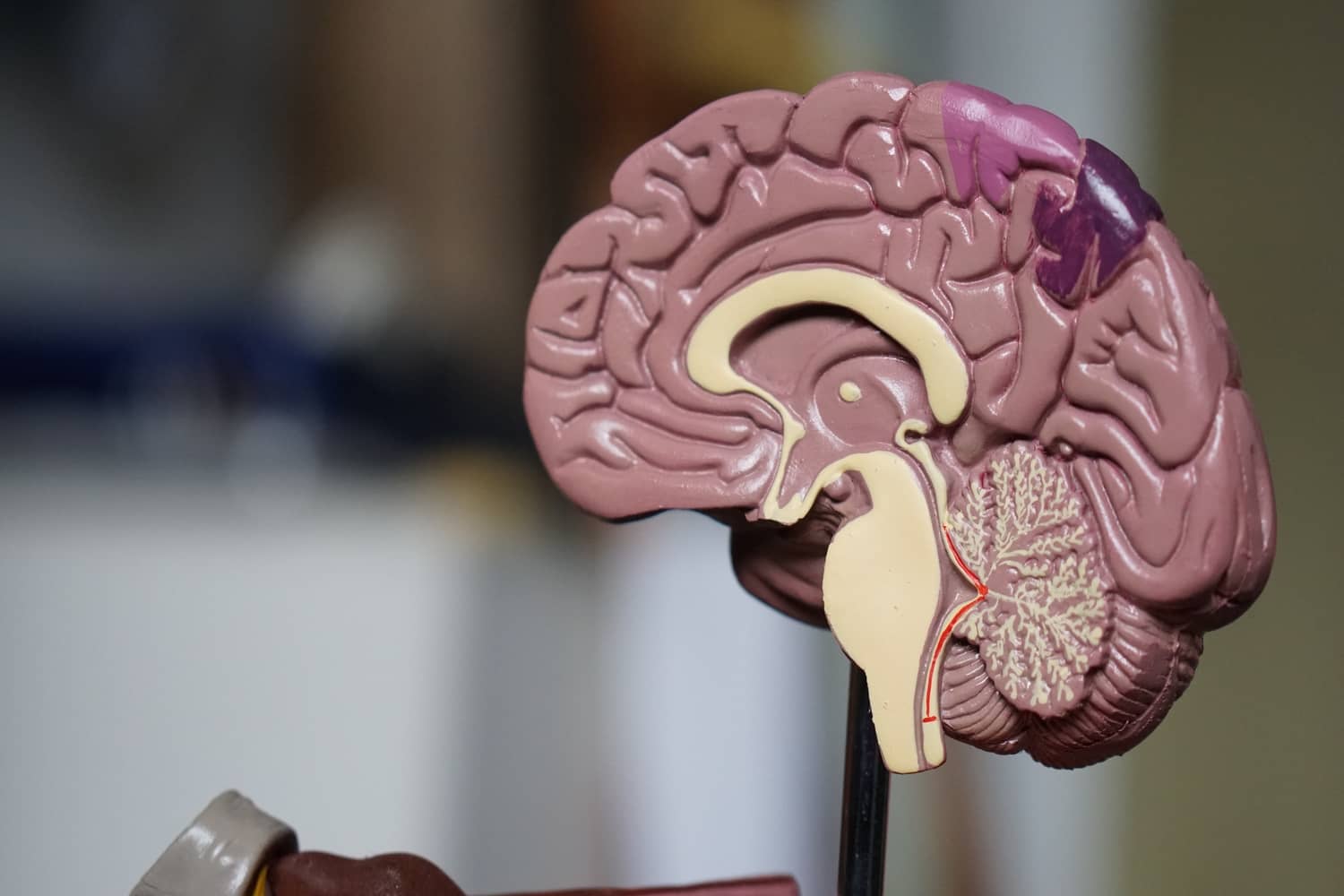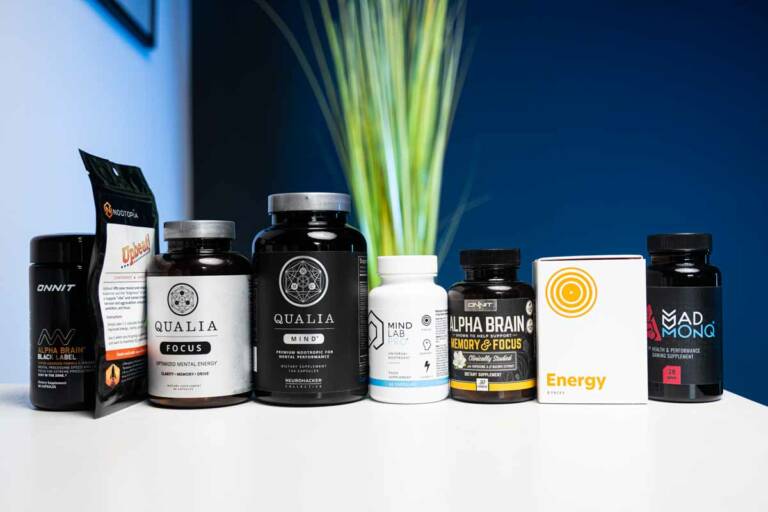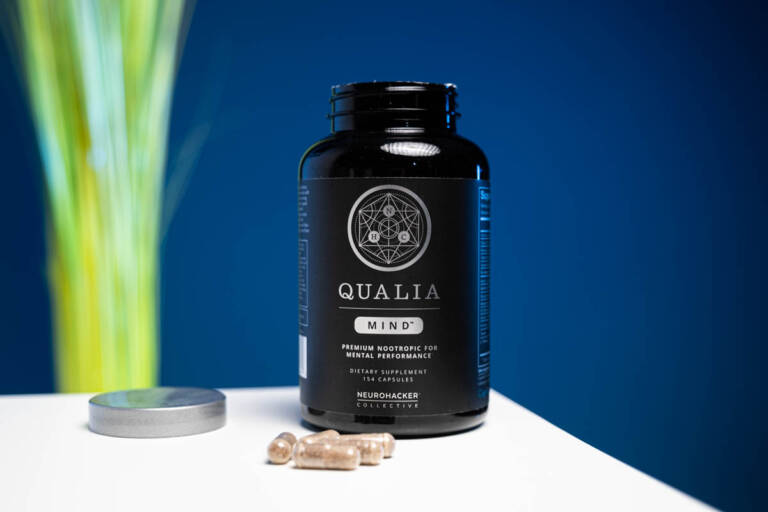Choline is an essential nutrient responsible for supporting various bodily functions including cellular growth, metabolism, memory, and other functions. When used as a nootropic, the best choline supplements can really enhance memory and cognitive function in a lot of different capacities.
In terms of classification, it is neither a vitamin nor a mineral but an organic, water-soluble compound. However, it is often grouped with B vitamins, given its many similarities.
The liver makes a small amount of choline, but most of this nutrient comes from the foods you consume.
Acquiring enough choline from the diet helps prevent health issues such as fatty liver and muscle damage which may occur with a choline deficiency. In the instance of pregnancy, a choline deficiency may also present the unpleasant possibility of birth defects.
On the other hand, taking choline supplements has shown benefits with regards to stroke recovery, Alzheimer’s disease, asthma, and ulcerative colitis.
What Are Cholinergic Pathways?
The cholinergic pathway is a term used to include all nerve cells, neurons, and receptors that use the neurotransmitter acetylcholine.
These nerve cells get activated by or contain and release acetylcholine for many bodily functions. The entire cholinergic system is associated with various aspects of cognition and emotional processing.
And the one thing needed to run these cholinergic pathways is choline.
Now, there are many choline sources available, but not all of them perform the same way. The benefits of choline can best be seen when the best choline supplements take care of the following two compounds:
Acetylcholine
This is the neurotransmitter that facilitates communication between neurons and within the neuromuscular junction.
Phosphatidylcholine
This is a key component of human cells and helps maintain cell structure and the cell membrane’s integrity.
Both these key compounds have many important functions to perform, and improving their levels may help support all types of cognitive functions and muscular performance.

How Does Choline Affect Health?
Studies on choline with regards to health have shown how this important nutrient helps different bodily functions.
Many, if not all these benefits are in some way or the other connected to the production of acetylcholine, which performs several different but essential functions in the body.
While there are many, the main benefits of choline can be summarized as the following:
Cardiovascular Health
Choline from the diet and its supplement form have an ambivalent relationship with heart health.
Research suggests that choline may both help protect and increase the chance of cardiovascular disease.
On the one hand, choline and the B vitamin folate help lower homocysteine blood levels by converting it to methionine.
Elevated homocysteine presents a greater threat to heart-related issues.
Some other research indicates that consuming optimal amounts of choline may help keep the heart and blood vessels healthy. This may be in part due to keeping blood pressure low.
Here acetylcholine makes a presence as it assists with heartbeat regulation. [1]
That said, some other research suggests that higher choline amounts could actually increase the chance of cardiovascular disease.
This is associated with an excessive intake of choline as it can interact with gut bacteria making the blood more susceptible to clotting.
Excessive choline helps produce a compound known as trimethylene N-oxide (TMAO), which can increase the threat of stroke, heart attack, and even death.
Some research also indicates that TMAO may be a direct contributor to narrowing arterial walls via plaque buildup. [2]
Neurological Health
Some research shows a link between higher choline consumption and improved cognitive function, such as better verbal and visual memory.
In this capacity, it is considered an essential nutrient for brain development. [3]
Choline is also needed for DNA synthesis, which is important for brain function and development.
Large observational studies link choline consumption and blood levels to improved brain function, including improved memory and processing.
Choline is also highly recommended for pregnant women to help improve fetal brain development.
Some evidence also suggests that it plays a role in developing and treating certain mental health disorders.
Nonalcoholic Fatty Liver Disease
Choline is a major component in liver function. The liver is one of the first places choline reaches after digestion.
It plays a part in liver health through various mechanisms, and without enough choline, there may be a higher than usual chance of chronic liver damage and liver failure. Fortunately, some of this can be resolved by investing in some of the best choline supplements readily available in the market.
Regarding the liver’s health, low choline consumption has also been linked to an increased possibility of developing the nonalcoholic fatty liver disease (NAFLD). [4]
This condition results in a fat buildup in the liver of individuals who don’t drink alcohol excessively and is a common liver disorder in overweight and obese people.
Phosphatidylcholine carries fats away from the liver and takes adequate choline in supplement form to prevent the liver from storing too much fat.
Unchecked or uncontrolled NAFLD can eventually progress to liver cirrhosis, liver cancer, or liver failure.
Any of these will prevent the liver from functioning normally but with sufficient choline consumption either through the diet or with supplements, proper liver performance can be maintained and NAFLD prevented.

Choline As A Nootropic
Nootropics are active compounds that act on the central nervous system to improve memory and cognitive function.
Among these, choline supplements are highly popular nootropics because choline is the precursor for the neurotransmitter acetylcholine.
Acetylcholine’s function in the brain is closely linked to memory and learning, alertness, and is sustaining attention.
Also, choline’s place in DNA synthesis makes it a potent nootropic as it contributes to the growth and repair of neuron connections in the brain.
So, when using choline supplements for nootropic benefits, there are three principal forms to consider.
- Choline Bitartrate
- Alpha-GPC
- Citicoline
For any of these forms to be effective, their choline content must be able to cross the blood-brain barrier successfully to do its work there.
Now, what you need to remember here is that not all choline types are equal. So, which one does its job best in the capacity of a nootropic? Here is what you need to know.
Choline Bitartrate
Commonly used in choline supplements, choline bitartrate is the simplest and cheapest form of choline. This is basically choline combined with a salt of tartaric acid to improve its bioavailability.
Choline Bitartrate has a much better absorption rate than free choline and suffices well enough for the liver’s choline benefits. However, choline bitartrate falls short when it comes to nootropic benefits as it is rather ineffective at crossing the blood-brain barrier.
By weight, choline bitartrate carries 41% choline, which is on the higher side when it comes to nootropic choline sources. Still, its inability to cross the blood-brain barriers renders it ineffective for cognitive enhancement and other such benefits.
One 2016 study shows how choline bitartrate does not work well for cognitive enhancement to corroborate its ineffectiveness for cognitive benefits. [5]
A choline supplement that uses this choline form should not be the first choice when looking for cognitive benefits.
Alpha-Glycerylphosphorylcholine (GPC)
Alpha-GPC carries 40% choline, closely following choline bitartrate in terms of density. Once again, this is substantial, but the advantage here is that this type of choline supplement is highly bioavailable and more effective at crossing the blood-brain barrier.
Alpha-GPC occurs naturally in the brain as a byproduct of phosphatidylcholine. When the brain is in need of more choline, it breaks down phosphatidylcholine from the brain cell membrane and converts it into alpha-GPC.
Among its functions, alpha-GPC increases human growth hormone, restores and boosts nerve growth factor receptors in the brain and stimulates the release of dopamine. [6]
If you look to food sources for Alpha GPC supplementation, it can naturally be found in red meats and organs, but to avail of its brain-boosting effects, you’d have to consume a lot of red meat.
As such, when you compare choline bitrate vs alpha GPC, the latter comes out the winner in rendering brain-boosting benefits.
Citicoline (CDP Choline)
Citicoline, also known as cytidine diphosphate-choline (CDP), doubles the nootropic benefits by firstly carrying 18% choline and then also cytidine. [7]
Upon ingestion, cytidine converts to uridine in the body, which is a very important nootropic.
And even though 18% choline seems like a smaller percentage when compared to choline bitartrate and alpha-GPC, its pairing with cytidine makes all the difference.
With this in mind, this choline supplement caters to preventing or treating age-related memory issues since both molecules have neuroprotective properties and can potentially enhance learning.
But if alpha-GPC provides the densest choline source able to cross the blood-brain barrier, then how does citicoline fare in comparison?
Citicoline actually manages to top alpha-GPC by yielding the very powerful nootropic duo of choline and cytidine by adding a little extra to what alpha-GPC already offers.
This makes citicoline one of the best ingredients in high-quality nootropic supplements.
But this is not all. Given its reliability and potency, citicoline is also used as a standalone supplement.
Are You Getting Enough Choline?
Most people in the U.S diet have less than the recommended choline, but few show symptoms of a choline deficiency. Even when choline is added via dietary supplements, the total consumption may still be below recommended amounts.
This concern becomes even more pronounced when considering certain demographics such as pregnant women, individuals with specific genetic conditions, or others being fed intravenously.
However, given the lack of available evidence, an RDI for choline has not been established, but the Institute of Medicine has set adequate intake (AI) values.
This value is intended to be sufficient for most healthy individuals and helps avoid the negative consequences of a deficiency such as liver damage.
The adequate choline consumption for women is 425 mg a day and 550 mg for men. Most healthy individuals will benefit from taking around 500 mg a day of these essential nutrients from either dietary choline or supplement form.
The daily upper limit for adults is 3,500 mg meaning that this is the highest intake level that is unlikely to cause harm.

Choline Food Sources
You can get choline from many foods, with the best sources being meat, fish, poultry, dairy, and eggs.
Among these, beef and beef liver have the highest choline supplies. Other foods like chicken breast, fish, and shiitake mushrooms will also yield good supplies of choline.
And for people who only follow vegetarian or vegan diets, the best sources of choline can be foods like potatoes, legumes, cruciferous vegetables such as cauliflower, broccoli, cabbage, or Brussel sprouts.
Vegetarians can also include dairy products like milk and yogurt as a good source of choline.
Yet, all things considered, a balanced diet contains less than optimal choline, so much of it may need to be acquired via a good choline supplement.
Can Choline Be Harmful?
Because choline is such a multifunctioning compound, adequate amounts are important for optimal health. However, consuming excessive choline can come with its own set of side effects.
Too much choline consumption can cause a fishy body odor, digestive discomfort like vomiting, salivation, profuse sweating, hypotension, and liver damage.
Some research also indicates that higher choline dosages may put heart health at risk.
Alpha-GPC Choline vs CDP Choline
Alpha GPC vs CDP choline are both close contenders, giving their brains boosting benefits and essentially serving the same purpose. Yet, the two are different in their own ways. Some things to keep in mind when choosing one or the other include the following:
Alpha GPC contains more choline than CDP, so it may be a more popular choice for strictly choline supplementation.
Also, alpha GPC has a shorter half-life when compared to CDP. While alpha-GPC lasts 4-6 hours in the body CDP does so for 60-70 hours. Consequently, choline accumulates in the system.
CDP breaks down into uridine, which may be less choline by weight but still functions as a 2-in-1supplement. Paired together, both choline and uridine deliver a double whammy of brain boosting benefits.
In the end, it may well come down to personal preference which choline supplement you opt for. The one thing to remember is to never use the two together as too much acetylcholine can cause brain fog.
Instead, it’s best to choose one choline supplement over the other.
Choline Supplement Stacks
While citicoline may well establish itself as the best choline source, biohackers like to stack it with other effective cholinergic compounds and others for optimal results.
For most people, a choline supplement that contains 500 mg of CDP a day will provide them with the right amount of choline for optimal brain development and memory function.
But if you’re stacking, then it is recommended to take choline with the following stacks:
Uridine monophosphate
Choline synergizes with uridine to improve neuron cell membranes and improve attention spans.
Caffeine
Caffeine increases acetylcholine production by improving the ability to absorb choline.
DHA
DHA also works in synergy with choline and uridine to produce phosphatidylcholine, which is also a source of choline in the body and helps boost acetylcholine production. Its benefits have been linked to support brain health, but it can also support liver function and keep cholesterol levels in check.
One 2014 study established that levels of phosphatidylcholine are directly linked to Alzheimer’s disease.

Who Should Take Choline Supplements?
While most people eat less than the AI for choline, a deficiency is not common in healthy individuals. This is because the body can make some choline on its own.
Also, the amount of dietary choline someone needs every day varies based on different factors.
For instance, people with certain genetic variations that potentially interfere with choline’s normal metabolism will require more of this nutrient than premenopausal women whose higher estrogen levels already stimulate choline production.
However, that said, certain demographics should take additional choline in supplement form to prevent the possibility of a deficiency.
Expectant Mothers
One group that should take care to monitor its choline levels is expectant mothers. They will need more choline every day as they may only be getting average intakes on the lower side. Plus, prenatal supplements don’t usually contain choline, so a choline supplement may be recommended.
TPN patients
Another demographic at a higher risk of a choline deficiency include individuals reliant on intravenous nutrition. Referred to as TPN or Total Parenteral Nutrition, these individuals may have digestive tract issues that don’t tolerate solid food due to digestive conditions, illness, or surgery.
Instead, they receive nutrition intravenously, and choline isn’t something typically included in TPN formulas unless specified.
Research shows that long-term TPN patients often suffer from NAFLD.
Individuals over the age of 45
Even if you are not interested in nootropics, we feel that anyone over 45 can benefit from a good choline supplement every day. The choline supplement will offer improved memory benefits and yield enhanced alertness, more energy, and faster recall.
Choline Supplement Considerations
Many choline supplements on the market are that many products do not list the amount or type of choline used in their formula. If you purchase any one choline supplement and start using it as instructed on the label, you could end up getting anywhere between as little as 50 mg to as much as 1,500 mg choline per serving.
Choline Type Used
On another note, one form of choline, such as choline bitartrate, is not typically used in top-grade choline supplements. Instead, it will most likely be found in pre-made nootropic stacks.
As mentioned earlier, choline bitartrate is not the best choline source for cognitive purposes. Its limitation to reach the brain makes it an ineffective nootropic.
As such, nootropics using choline bitartrate will be less potent and perhaps even ineffective compared to those using citicoline or alpha-GPC.
Although choline bitartrate has become more widely used by nootropic manufacturers, it is not something you will find in top-tier products.
Amount Of Choline Used
Some of the side effects of excessively high choline consumption include low blood pressure and liver toxicity.
Too much choline can also lead to excess production of TMAO, which elevates the concern of heart disease.
When used as recommended, choline bitartrate, alpha GPC, and citicoline are all safe to use.
Individually, none of the studies looking at choline bitartrate mention the participants experiencing any adverse effects. The only downside could be from overconsumption of choline bitartrate resulting in headaches, a lack of focus, confusion or muscle spasms, or cramps.
The same also goes for the other two forms of choline.
Verdict
To sum up, we believe that when you take the best choline supplements, it can really make a significant improvement in cognitive enhancement. The key is to know what type of choline source to use.
We consider both citicoline and alpha GPC to be superior sources for improving choline levels than choline bitartrate. The best choline supplements will use the former two types when used for memory improvement and other and cognitive purposes.
While both citicoline and alpha GPC and important and excellent options, citicoline may have a slight edge as the better choline supplement given its choline and cytidine properties. So, if you need nootropic help in any capacity, don’t hesitate to take a choline supplement into consideration.





